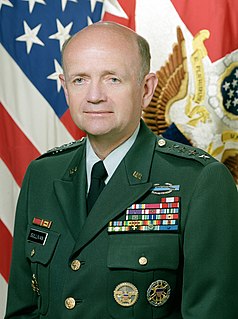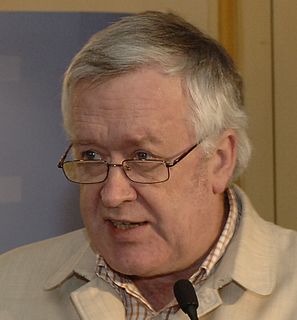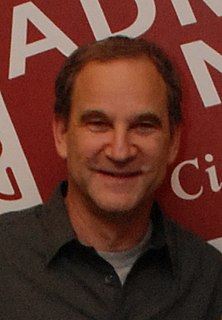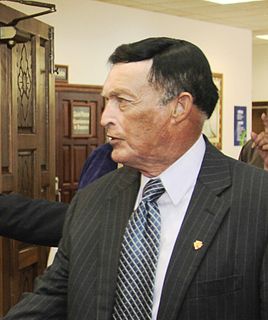A Quote by Michael Bloomberg
People vote against their own interests that all the time. But when you do the polling in the U.S., it has gone from less than 50 percent who thought climate change was real to 70-odd percent. And if you listen to the Republicans in Congress, they used to say, "Oh, climate change doesn't exist." Then they switched to "Well, it exists, but it's not man-made," to "Well, I'm going to address the issue." Why? Because when they go home, the local constituent says, "Wait a second. What are you talking about? We just had a flood. We haven't had rain in a long time." They can't get away from it.
Quote Topics
About
Address
Against
Away
Because
Change
Climate
Climate Change
Congress
Exist
Exists
Flood
Get
Get Away
Go
Go Home
Going
Gone
Had
Home
Interests
Issue
Just
Less
Listen
Local
Long
Long Time
Made
Man
Man-Made
Odd
Oh
Own
People
Percent
Polling
Rain
Real
Republicans
Say
Says
Second
Switched
Talking
Than
Then
Thought
Time
Used
Vote
Wait
Well
Why
Related Quotes
Climate Change is a national security issue. We found that climate instability will lead to instability in geopolitics and impact American military operations around the world. People are saying they want to be perfectly convinced about climate science projections. But speaking as a soldier, we never have 100 percent certainty. If you wait until you have 100 percent certainty, something bad is going to happen on the battlefield.
Fifty percent of the world's population lives in cities. In a couple of decades, 70 percent of the world's population will be living in cities. Cities are where the problem is. Cities are where the solution is, where creativity exists to address the challenges and where they have most impact. This is why, in 2005, the C40 was founded, an organization of cities that address climate change. It started with 18 cities; now it's 91. Cities simply are the key to saving the planet.
For sure I would prefer Trump had not withdrawn from the Paris Agreement. But the fight against climate change is really done at the local level - whether it's cities, local governments or the private sector, corporate and individual. No matter what Trump says, nobody is going to go back and take the scrubber out or change back to polluting. The damage that Trump can do is if there are countries that are on the fence about whether they want to address the issue, this gives the naysayers, the doubters, those that don't want to do anything, a little more ammunition.
We can no longer completely avoid anthropogenic climate change. At best, limiting the temperature rise to two degrees is just about possible, according to optimistic estimates. That's why we should spend more time talking about adjusting to the inevitable and not about reducing CO2 emissions. We have to take away people's fear of climate change.
Millennial voters are very concerned about climate change and will vote for candidates who are planning to address it. But the systems that are in place - people talk about gerrymandering and the money that's in politics, this is a real thing, a real effect - and it's hard for climate change-denying legislators to get voted out. But I predict it will happen.
Hollywood is the perfect conduit for the urgent message about climate change. We raise awareness all the time. We routinely take a film that nobody knows about and get 80 percent of the public to know about it in just 30 days. That's called marketing. We need to harvest Hollywood for climate change awareness.
About forty percent of the people vote Democrat. About forty percent vote Republican. Of those eighty percent, most wouldn't change their votes if Adolf Hitler was running against Abe Lincoln - or against FDR. . . . That leaves twenty percent of the people who swing back one way or another . . . the true independents. . . . That twenty percent controls the destiny of the country.
I don't believe that climate-change fiction will change the mind of a denier because most of the deniers I've met are basically in a cult situation. It's a faith issue. It's not a rational issue. There's no fact that's going to change their mind. They simply believe in the cult of climate-change denial and it somehow feeds into the rest of the mythos of their own life story.
Despite the international scientific community's consensus on climate change, a small number of critics continue to deny that climate change exists or that humans are causing it. Widely known as climate change "skeptics" or "deniers," these individuals are generally not climate scientists and do not debate the science with the climate scientists.
I think climate change is probably the most extreme, and it's been going on for years because it's very difficult to talk about a planetary issue like climate change and to get people who live within four-year electoral cycles to actually pay attention to something that you predict is happening way in the future.
It's very hard to track down what's real and what's not real. We haven't absorbed what climate change is doing. Because whether people associate it or not, fear of immigration is completely related to climate change, because the mass migrations that are happening, the war in Syria, all of these structural human migrations are related to climate change.
































